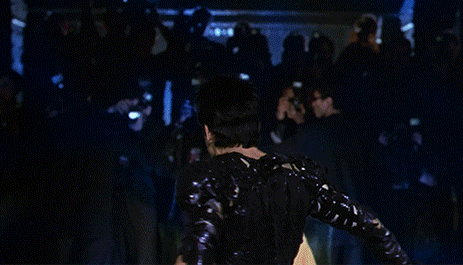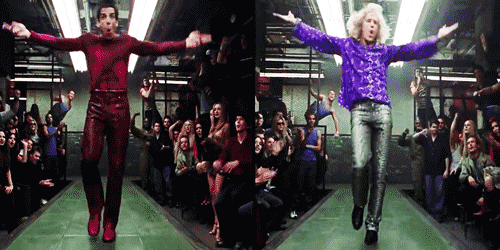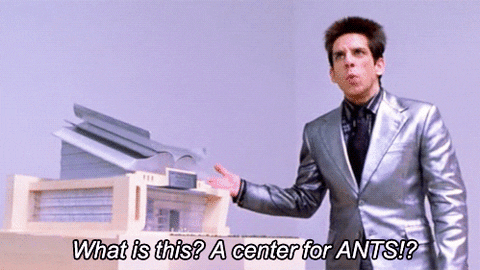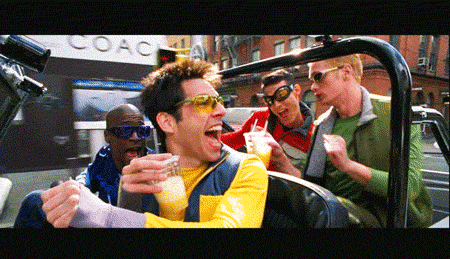But Why Male Models?
Comedic gold, problematic ableism and emotional intelligence in Zoolander!
It’s fun to laugh at models, right? It’s even more fun to laugh at male models! This is the principal premise of one of the most successful movies of the early 2000s: Zoolander. Premiering in 2001, it was such a hit with my high school friends that whole sections of dialogue became a permanent feature of our vocabulary.
It’s been such a rough start to 2024, and while the world burns and the future of humanity looks ever more bleak, I needed a bit of comic relief. Who better to provide that than a misshapen ball of clay, three-time male model of the year and epic eugoogoolizer: Der-ek Zoo-lan-der.
Welcome to AutCasts, a free bi-weeekly newsletter by writer, Aisling Walsh, exploring neurodivergence through cinema’s oddballs, misfits & rebels!
Zoolander is a 2001 comedy written and directed by Ben Stiller. Derek Zoolander (Ben Stiller), is a male model struggling to cope with a recent downturn in his career and the tragic death of his best bunk-mates in a freak gasoline fight accident. He decides to return to his roots and find something more meaningful to do with his life than just being really, really, good-looking. Meanwhile, fashion designer Mugatu (Will Ferrell) is pressured by a secret society of fashion moguls to assassinate the newly elected Prime Minister of Malaysia (Woodrow Asai) who wants to regulate the sweatshop industry in his country and raise wages. Mugatu lures Derek into this plan with the promise of a fashion show that will reignite his career, but secretly uses this campaign to train Derek as an assassin. Investigative journalist Matilda (Christine Taylor), discovers the plan and alerts Derek to the imminent danger. They team up with his arch-nemesis, and fellow male model, Hansel (Owen Wilson) to save the Malaysian Prime Minister and out Mugatu.
A model idiot?
I most likely saw Zoolander in the cinema with friends, but the experience of my first viewing has blended into years of rewatches, beaten only by my old favourite, The Big Lebowski. Zoolander is one of my go-to feel-good movies and it would be the perfect comedy, if it were not for the distinct veins of ableism and racism running through it.
Derek and Hansel are quintessential himbos: more concerned about beauty and fashion, than anything serious, intellectual or current-affairs related. They are self-absorbed, vacuous and insensitive douchebags. The movie’s humour hinges on the absurdity of the model industry, their supposed lack of intelligence and their complete disconnect from the real world.
Derek is referred to as an idiot, simpleton and other ableist slurs many times throughout the movie. His famous Time Magazine cover has two epic puns: 'A Model Idiot? (the title of Matilda’s piece) with Derek wearing a t-shirt with the words ‘I’m with Stupid’ in an arrow pointing upwards (incidentally one of my favourite albums ever - thank you Aimee Mann). But then, who really reads that little Time Magazine?
In an era where the ‘R’ word was routinely used for comedic effect in cinema (see 1998’s There’s Something About Mary - another Ben Stiller “classic” for one of the most egregious examples) Zoolander feeds into the comedic sub-genre centred on making fun of people we consider to be of lesser intelligence.
I have wanted to write about Zoolander for a while and yet I have been rather wary about locating it within a genre of ‘outcasts’ who may or may not be neurodivergent. Derek, for starters, is not an outcast at all. He is one of the most successful and well-loved male models in his universe. Yet his declining career and the death of his best bunk-mates provokes a crisis of identity. As we peel back the layers (he has at least a few) we see that Derek was an outcast in his New Jersey mining town where his family could not except his interest in fashion or beauty and what that might say about his masculinity and sexuality.
But more than that, I was wary of focusing on a movie where the “stupidity” and “idiocy” of the main character are the source of most of the punchlines.
Long before autism became a recognised diagnosis, words like moron, idiot and cretin were medical terms used to characterise people considered mentally “deficient.” These kinds of “deficiencies” included non-verbality and unusual forms of processing and interacting with the world that we now recognise as neurodivergence or intellectual disability. An accusation/diagnosis of idiocy often led to institutionalisation, where people, considered less-than-human for their divergent body-minds, could be locked away for their whole lives. When we use these words we continue to reproduce the violence that has tried to keep the neurodivergent and disabled “contagion” separate from the neuronormative world of productive body-minds who fit seamlessly into a cishetero-patriarchal, white-supremacist, ableist and capitalist regime. Phew!
The disabled community and neurodiversity movement have begun to push back against the everyday use of kind of stigmatising language and how we measure and judge others against a very narrow definition of intelligence and cognitive ability.
The affection for its main characters saves Zoolander from the sins of lesser movies. Beneath the barbs we can see and appreciate other forms of intelligence such as aesthetic and emotional intelligence. Derek and Hansel are experts in their medium and hold an encyclopaedic knowledge of their industry. They can do their own hair, make-up and styling and they occasionally show moments of awareness, concern and care for others. Despite the reliance on ableist slurs to characterise Derek, and to a lesser extent Hansel, I appreciate that the movie recognises the existence of other forms of intelligence beyond IQ scores.
I’m not an ambi-turner!
Despite all these misgivings, Zoolander makes me laugh like few other movies. It’s not just the chance to poke gentle fun at an industry that has historically created impossible beauty standards for both men and women. It’s also because many of the jokes hinge on Derek’s miscommunication or his tendency to take things literally. Whether it is his mispronunciation of eugoogooly (honestly a much better word than eulogy), his confusion about the ‘centre for ants’ or his ‘earth to Matilda’ explanation, there is something in all of these blunders that mirrors my own experience.
I have regular communicational short-circuits where I mix-up or misread pronunciations or confuse the order of letters in certain words, even when I know the correct way to say the word. Like the ‘school for ants’ incident, I often take things presented to me on face value and only realise later that I have misunderstood some fundamental element that should have been obvious (ie. the school is just a scaled model). And more often than not I take things very, very, literally or completely miss obvious jokes. For example, I only realised while writing this that Mugatu’s Derelicte collection is a play on Derek and his declining career - facepalm! Other misses happen in real-time:
I recently told a friend that I wanted to go to LegoLand on my honeymoon, since I’m getting married in Denmark (this June!!).
She replied saying: ‘Oh, I’ve heard the place has gone to pieces.’
I said: ‘Oh no, really?’
I was gutted to think that the park had deteriorated through neglect.
She simply stared at me until I realised that this was a pun on Lego being made of pieces. We had a good laugh about the missed joke, but a year later here I am still thinking about what an “idiot” I felt like that day for not picking up on it sooner.
Words like “idiot”, “stupid” or “moron” permeate our everyday language to a startling degree. As much as I agree that they are harmful and should be dropped from use completely, I have used these words against myself on a daily basis for over 35 years. Many other people have applied those terms to me in a variety of situations, and sure, it hurt. But the violence of the language I have applied to myself, my abilities and my perception of the world feels far more insidious and is a habit of thinking that is far harder to break.
Since discovering my autistic identity, and the neurodiversity movement, I have been reeducating myself about the origin and harm surrounding these terms. I hope that as our culture begins to recognise the violence behind the language we apply to ourselves and others so casually.
A mishapen ball of clay
There are still things to love about Zoolander:
The most obvious joke is that neither Derek nor Hansel are really male model material and, at nearly 40, both actors are well past their modelling ‘prime.’
It challenges hegemonic masculinity even as it makes fun of male models. Derek and Hansel are allowed to prance and preen and care about fashion and beauty and their skills on the cat-walk.
Zoolander is extremely sex-positive (for its time) including a scene centred on a hallucinogenic orgy where people of all genders, races and body-types participate. There are many queer-coded characters and not all of them are villains (any and all of the male models - except, perhaps, Moulder). The sexuality of both Hansel and Derek could be read as fluid, as they clearly vibe with each other and were enthusiastic participants in the orgy. Dereck and Matilda’s first sexual encounter happens in the middle of the orgy and there is no jealousy nor possessiveness in evidence. And let’s not forget Mila Jovovich as Mugatu’s Kink-queen henchwoman, Katinka, who is clearly turned on when Matilda straddles and slaps her onstage. That’s a hell of a lot of queer energy for a 12-rated movie that came out in 2001!
The only two significant characters played by women, in what is essentially a bro movie, are at least given something interesting to do. One the one hand, there is the fashion-less, smart and dedicated, investigative journalist Matilda. She is allowed to have a career and a sex life all at once while also providing some pointed commentary on eating disorders. On the other, there is the latex-clad Katinka, who is a main player in Mugatu’s evil schemes.
The movie even manages to squeeze in some real truths about fast fashion and the many ways the fashion industry has sought to exploit people over two centuries.
There too many cameos to mention, but some of my favourites and the ones that (as far as I’m aware) remain unproblematic include Billy Zane, Lenny Kravitz and the Reality Bites micro-reboot where Winona Ryder cosies up to Derek at a party.
The joke that has aged least well, however, is the problematic use of black face when our heroes sneak into Ballstein’s models disguised as actual people of colour: Taj Crown (Hansel) and Godfrey (Derek). When they wipe their make-up off their faces they resemble chimps and begin to attack the computer like apes in a parody of 2001: A Space Odyssey. Stiller would come under even greater criticism for his use of black face as a central joke in 2008’s Tropic Thunder. Taken together it’s a rather troubling tendency from a white actor-director, which Stiller continues to defend! This writer hopes that black face, along with the ableism, would be far harder to swallow for today’s audience.
As for Zoolander 2, ant the Benedict Cumberbatch debacle, it’s clear that in 2016, while black people and disabled people were no longer acceptable targets of humour, trans and non-binary people still were/are.
We all wish that movie simply didn’t exist.
What I’m reading:
This wonderful essay from Rafael Frumkin of The Cosmic Cheeto on one of my favourite magazines, Electric Literature, about what it means to be an autistic author. This was exactly the literary tonic I needed today as I try to get my head around multiple fiction and nonfiction projects and what it means to write about autistic joy:
There’s such great joy to be had in experiencing the world with the technicolor hyper-empathy my neurotype affords me, or in contributing to the destabilization of the cisheteropatriarchy simply in the ways I speak, act, and dress.
You can read the full article here and his new short story collection, Bugsy, has made it to the top of my To Be Read pile!
This article for The Guardian explores the recent surge in AuDHD diagnoses and self-identification which really resonated with my own experience, particularly as I try to understand just how my ADHD and autism compete and complement each other!
I’d like to give a warm welcome to Conor , fellow Irishman and Autistic, who just started writing on Substack. I’m looking forward to reading more!
What I’m listening to:
The Bechdel Cast have some great new episodes on some of my not-so-favourite movies from the last year including Barbie and Poor Things. In even more exciting news (for Irish readers anyway), they are coming to Dublin on the 29th of May as part of their Shrektanic tour! (Yes, I’ve already got my tickets!)
In light of yesterday’s not-sad news about the passing of OJ Simpson, I highly recommend the epic You’re Wrong About multi-episode exploration of the murder of Nicole Brown and the initial hearings in the “trial of the century.” Fans of the show are waiting with baited breath for Sarah to finish this series, but the existing episodes offer one of the greatest insights into the dynamics of domestic abuse I have ever heard.
If you liked what you read, please tap the heart 💕 below and consider subscribing (for free) or sharing this essay. As an independent writer it’s the best way to support my work!
I’ll be back next time with a run-down of my favourite neurodivergent memoirs and in the meantime keep an eye out for something special dropping next week over on Beyond Survival with Clare Egan !
There is so much to say about Zoolander but not enough room to say it! What did you love or hate about the movie or the many Ben Stiller-Owen Wilson-Vince Vaughan collaborations it spawned (I’m thinking Dodgeball)?






Parodies!